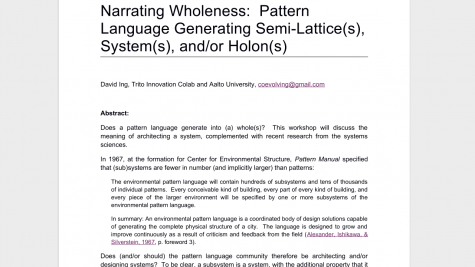In what ways might the generation of wholeness through pattern language be strengthened, through an appreciation of advances in the systems sciences? A workshop at the 2018 International PUARL Conference was an opportunity to review linkages and discuss some details.
An outline to frame the conversation was written in three parts.
- 1. Communicative Framing
- 1.1 Form and synthesis
- 1.2 Organization as semi-lattice
- 1.3 Systems generating systems
- 1.4 Generative patterns and non-generative patterns in software development
- 1.5 System-A and system-B, as two ways of shaping and building living environments
- 1.6 Holons (from systems ecology)
- 2. Dialectical Sensemaking
- 2.1 Types of systems and models
- 2.2 Autopoiesis and allopoiesis
- 2.3 Economies as agricultural, industrial and services (coproduction)
- 3. Narrative Synthesizing
In full, the abstract read:
Does a pattern language generate into (a) whole(s)? This workshop will discuss the meaning of architecting a system, complemented with recent research from the systems sciences.
In 1967, at the formation for Center for Environmental Structure, Pattern Manual specified that (sub)systems are fewer in number (and implicitly larger) than patterns:
The environmental pattern language will contain hundreds of subsystems and tens of thousands of individual patterns. Every conceivable kind of building, every part of every kind of building, and every piece of the larger environment will be specified by one or more subsystems of the environmental pattern language.
In summary: An environmental pattern language is a coordinated body of design solutions capable of generating the complete physical structure of a city. The language is designed to grow and improve continuously as a result of criticism and feedback from the field (Alexander, Ishikawa, & Silverstein, 1967, p. foreword 3).
Does (and/or should) the pattern language community therefore be architecting and/or designing systems? To be clear, a subsystem is a system, with the additional property that it is contained within a larger whole.
The workshop will be conducted as a participatory session, with an intent to summarize findings for the proceedings. The workshop is organized as three steps:
- 1. Communicative Framing
- 2. Dialectical Sensemaking
- 3. Narrative Synthesizing
The extended abstract (below) outlines the workshop. Subsequent publications (i.e. a blog post) may be released after the event, to summarize some of the discussions and findings.
Audio for the session was recorded. In a departure from my usual presentations, I decided not to create a full slide deck, but instead step through the textual article. The video accessible on Youtube roughly lines up the sections in the paper to the talk.
The plenary sessions preceding the workshop had run overtime, so this workshop was cut short in order to let participants catch lunch.
| Audio | |||
| October 27 (24m16s) |
[20181027_PUARL_Ing NarratingWholenessGenerative.mp3] (23MB) |
||
For people who want to warch offline, here are some downloadable video files.
| Video | H.264 MP4 | WebM |
| October 27 (24m16s) |
[20181027_PUARL_Ing HD m4v] (HD 1448Kbps 287MB) [on the Internet Archive] [20181027_PUARL_Ing nHD m4v] (nHD 40Kkps 32MB) |
[20181027_PUARL_Ing HD webm] (HD 217Kbps 76MB) [20181027_PUARL_Ing nHD webm] |
PUARL has been prominent in continuing the Christopher Alexander legacy, with director Hajo Neis as one of the original coauthors of pattern language works since the 1970s. Formally, the Portland Urban Architecture Lab has focused on built environments with architects and designers. Beyond them, the systems foundations in pattern language should recognize that the movement has now included software developer since the 1990s, and social change practitioners since the mid-2000s .
Reference:
- Alexander, Christopher, Sara Ishikawa, and Murray Silverstein. 1967. Pattern Manual. Berkeley, California: Center for Environmental Structure.



